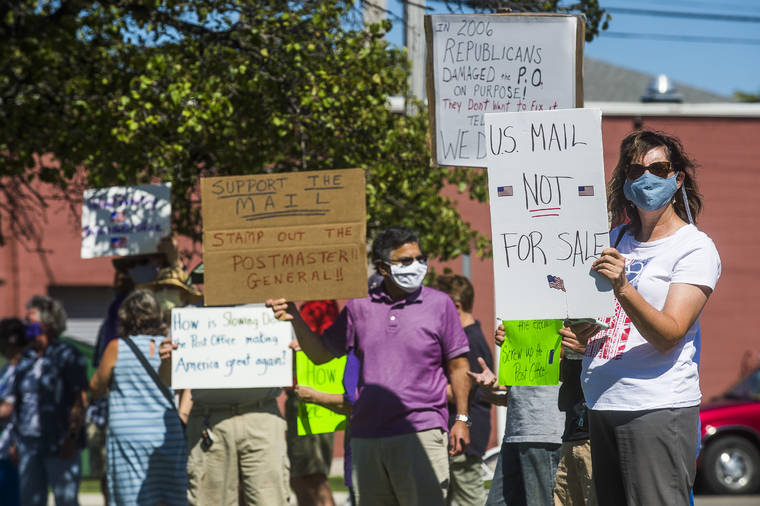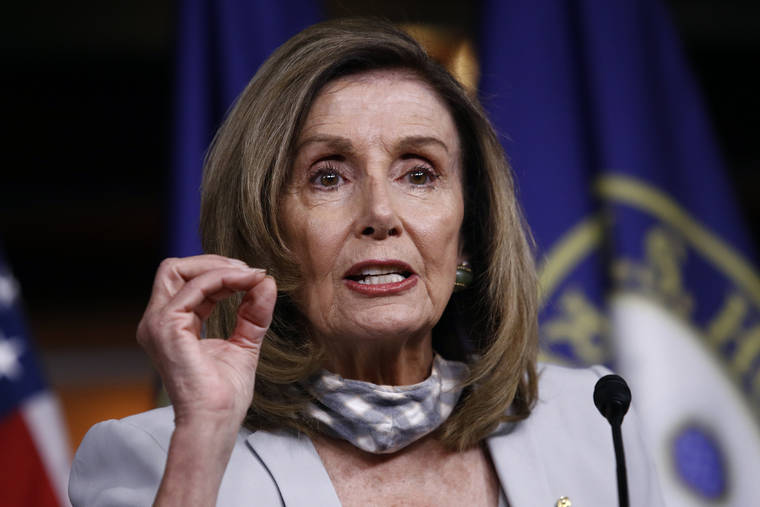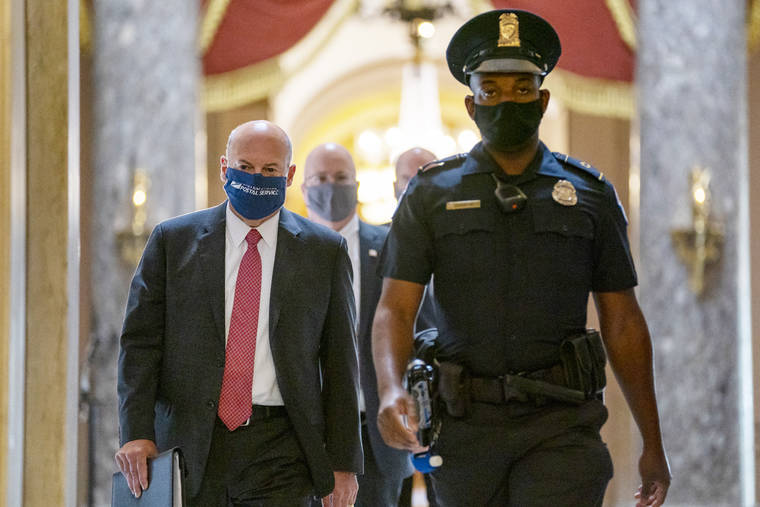Postal Service suspends changes after outcry over delivery slowdown

Rosemary King, right, holds a sign as a few dozen people gather in front of the United States Post Office to protest recent changes to the USPS under new Postmaster General Louis DeJoy, Tuesday, Aug. 11, 2020 in Midland, Mich. (Katy Kildee/Midland Daily News via AP)

FILE - In this Aug. 5, 2020, file photo vote-by-mail ballots are shown in U.S. Postal service sorting trays the King County Elections headquarters in Renton, Wash., south of Seattle. The U.S. Postal Service has sent letters to 46 states and the District of Columbia, warning it cannot guarantee all ballots cast by mail for the November election will arrive in time to be counted, The Washington Post reported Friday, Aug. 14. (AP Photo/Ted S. Warren, File)

House Speaker Nancy Pelosi of Calif., speaks during a news conference on Capitol Hill in Washington, Thursday, Aug. 13, 2020. (AP Photo/Patrick Semansky)

President Donald Trump speaks with reporters as he walks to Marine One on the South Lawn of the White House, Monday, Aug. 17, 2020, in Washington. Trump is en route to Minnesota and Wisconsin. (AP Photo/Alex Brandon)

FILE - In this Aug. 5, 2020, file photo Postmaster General Louis DeJoy, left, is escorted to House Speaker Nancy Pelosi's office on Capitol Hill in Washington. The U.S. Postal Service has sent letters to 46 states and the District of Columbia, warning it cannot guarantee all ballots cast by mail for the November election will arrive in time to be counted, The Washington Post reported Friday, Aug. 14. DeJoy, a former supply-chain CEO and a major donor to President Donald Trump and other Republicans, has pushed cost-cutting measures to eliminate overtime pay and hold mail until the next day if postal distribution centers are running late. (AP Photo/Carolyn Kaster, File)
WASHINGTON — Postmaster General Louis DeJoy, facing intense criticism from Democrats, state attorneys general and civil rights groups, said the Postal Service would suspend cost-cutting and other operational changes until after the 2020 election.
WASHINGTON — Postmaster General Louis DeJoy, facing intense criticism from Democrats, state attorneys general and civil rights groups, said the Postal Service would suspend cost-cutting and other operational changes until after the 2020 election.
Those moves, which included eliminating overtime for mail carriers, reducing post office hours and removing postal boxes, have been criticized as an attempt to disenfranchise voters seeking to vote safely during a pandemic.
“There are some long-standing operational initiatives — efforts that predate my arrival at the Postal Service — that have been raised as areas of concern as the nation prepares to hold an election in the midst of a devastating pandemic,” DeJoy said in a statement. “To avoid even the appearance of any impact on election mail, I am suspending these initiatives until after the election is concluded.”
DeJoy, who took over as the postmaster general in May, vowed that retail hours at the post office would not change, that no mail processing facilities would be closed and that overtime would continue to be approved. It was unclear, however, whether the agency would reverse measures that had already been put in place across the country, or just prevent additional changes from going forward.
The announcement came as lawmakers summoned DeJoy to testify before the House and the Senate in the coming days and as a coalition of 22 state attorneys general announced Tuesday that they would sue the Trump administration over operational changes at the post office, alleging that the new policies could undermine vote by mail in the November election. Those lawsuits, which are being filed by Washington and Pennsylvania, along with other states, seek to reverse the changes DeJoy has carried out.
Lawmakers in both parties and voter rights advocates have accused DeJoy of making policy changes that jeopardized not only voters’ ability to cast their ballots safely in the general election, but also the delivery of important medicines, paychecks and documents.
In a sign of the severity of the backlash, the House was set to return from its annual summer recess on Saturday and vote on legislation put forward by Democrats that would revoke policy changes until Jan. 1, 2021, or the end of the pandemic, as well as include $25 billion in funding for the beleaguered agency. DeJoy’s announcement did not change those plans to return, a senior Democratic aide said Tuesday.
“They felt the heat,” Speaker Nancy Pelosi of California said at a Politico Playbook event moments after DeJoy released his statement. “And that’s what we were trying to do, make it too hot for them to handle.”
DeJoy also announced the expansion of a leadership task force on election mail to “help ensure that election officials and voters are well informed and fully supported by the Postal Service.”
The cost-cutting measures carried out by DeJoy followed years of public criticism by President Donald Trump, who has accused the Postal Service of being poorly run and not charging high enough rates to private companies like Amazon and the United Parcel Service.
“Why is the United States Post Office, which is losing many billions of dollars a year, while charging Amazon and others so little to deliver their packages, making Amazon richer and the Post Office dumber and poorer? Should be charging MUCH MORE!” he wrote in a December 2017 tweet.
In April 2018, Trump tapped Treasury Secretary Steven Mnuchin to lead a task force on Postal Service reform, and many of the changes that DeJoy was preparing to put in place were outlined in a report that the task force published at the end of that year. The report offered a broad critique of the Postal Service’s business model and concluded that an antiquated mission — along with changing market forces — left the agency ripe for financial collapse.
On Tuesday, Washington and Pennsylvania filed lawsuits against the administration, which will be joined by other states including Michigan, Wisconsin and Minnesota. New York’s attorney general, Letitia James, said Tuesday that she intended to file as well.
In a news release, Attorney General Bob Ferguson of Washington state said DeJoy had enforced drastic changes to the Postal Service unlawfully.
“For partisan gain, President Trump is attempting to destroy a critical institution that is essential for millions of Americans,” Ferguson said in a statement. “We rely on the Postal Service for our Social Security benefits, prescriptions — and exercising our right to vote. Our coalition will fight to protect the Postal Service and uphold the rule of law in federal court.”
Connecticut’s attorney general, William Tong, said his office had received complaints from across the state about slowdowns in mail delivery. Among them, medicine was not being delivered to sick seniors and child support payments were arriving late to financially insecure mothers. In August, some Connecticut voters were denied their right to vote when their absentee ballots arrived late, he added.
“We will not allow Donald Trump to steal the election by sabotaging the United States Postal Service,” Tong said in a statement. “He cannot unilaterally impose onerous and arbitrary new conditions on the Postal Service to suit his political needs. The president greatly misjudged the anger his unlawful policies would unleash across this country.”
© 2020 The New York Times Company


